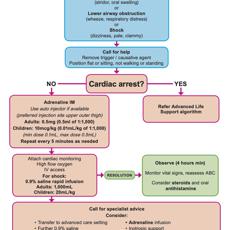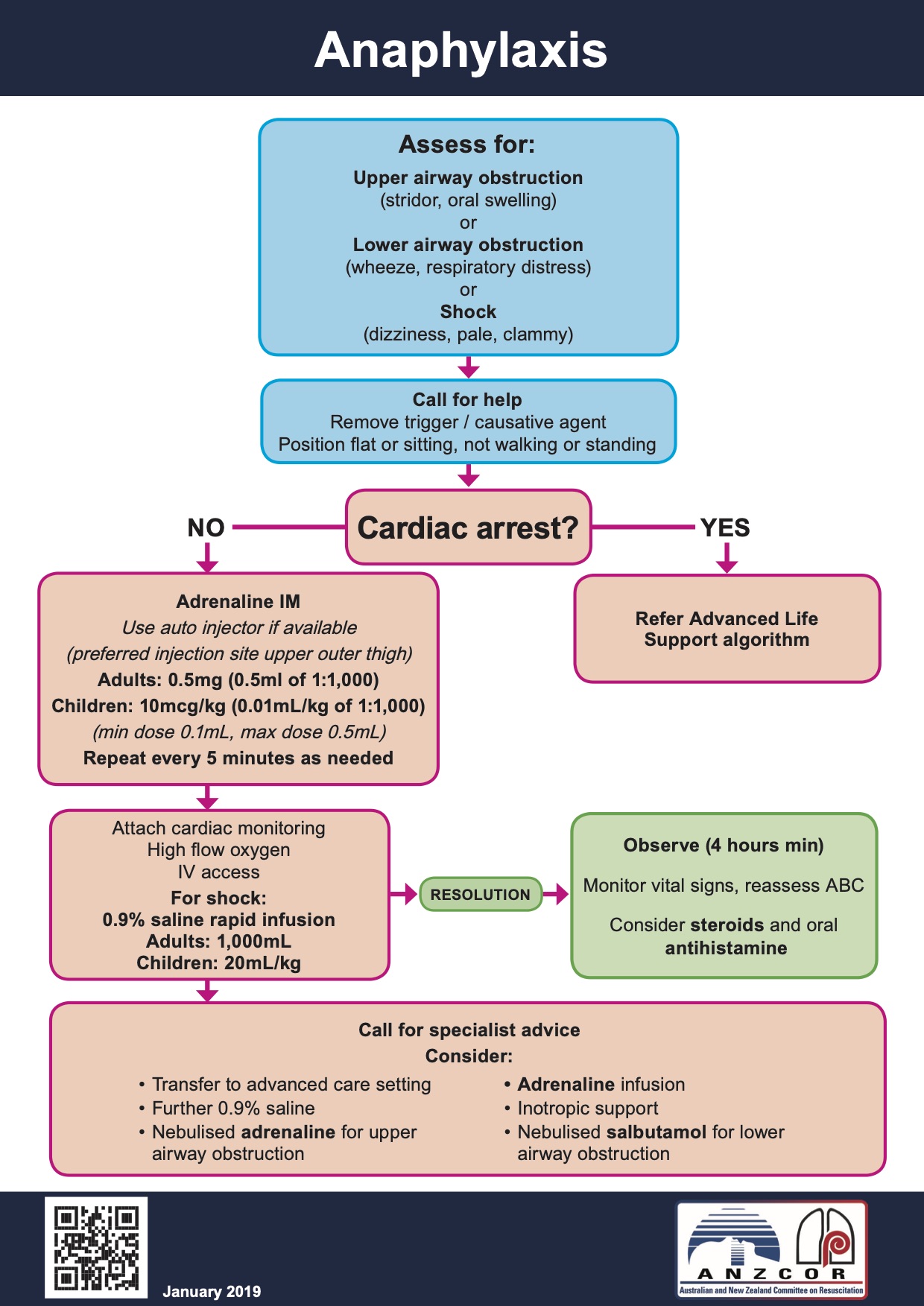Anaphylaxis
Anaphylaxis is the most severe form of allergic reaction, often affecting several parts of the body, including either the respiratory system, cardiovascular system, or both.
Symptoms typically occur within 30 minutes of exposure, often within five minutes, and usually develop rapidly. It is rare for the onset of symptoms to be delayed for hours after exposure.
- Commonly used terms and definitions
- Causes
- Symptoms
- Pathophysiology
- Risks
- Diagnosis
- Management
- Ampules and Vials
- IM Injection
- ACC cover

Commonly used terms and definitions
Allergy – This is an immune response to a particular food. Symptoms should occur every time that food is ingested. These immune system changes fall into two categories: Immunoglobulin E (IgE) mediated and non-IgE-mediated.
Sensitization – This is the detection of specific immunoglobulin E (IgE) through skin prick or blood testing towards a specific food, but without the development of symptoms after that food is ingested. In other words, a positive allergy test results in a food that your child has eaten without any problems, or has never eaten.
IgE mediated hypersensitivity/allergy – Commonly referred to as “food allergy”, in which IgE antibody specific for a food is formed and attaches to the allergy cells throughout the body. Whenever that food is ingested, it causes immediate onset symptoms, usually within minutes or up to 3 hours after ingestion. Typical symptoms include hives, swelling, itchy/water nose and eyes, difficulty breathing/swallowing, vomiting, and can progress to loss of consciousness. Skin prick or blood specific IgE testing is very likely to be positive for that food.
Anaphylaxis – Rapid onset, progressive, severe symptoms involving more than one organ system that can occur with IgE mediated food allergy.
Non-IgE mediated reaction – This is an immunologically mediated, typically delayed-onset reaction to a particular food. This is mediated by other parts of the immune system separate from IgE, specifically T-cells. These symptoms are not immediate in onset and can occur hours to days after ingestion. Anaphylaxis is not part of this response and most symptoms involve the gastrointestinal tract, with vomiting, upset stomach, diarrhea, or blood in the stool. Skin prick or blood specific IgE testing is negative.
Sensitivity or intolerance – This is a non-immunologic response to a certain food or foods. Symptoms occur when that food is consumed but may be variable over time. This also most often includes gastrointestinal symptoms and does not include symptoms observed with IgE mediated reactions. Skin prick or blood specific IgE testing is negative.
Causes
Common causes include foods such as peanuts, tree nuts, sesame seeds, fish, shellfish, dairy products, and eggs. However, many other foods can also cause severe reactions.
Non-food causes include wasp or bee stings, natural latex (rubber), penicillin or any other drug or injection.
In some people, exercise can trigger a severe reaction - either on its own or in combination with other factors such as food or drugs (e.g. aspirin).
Exposure to cold (usually cold water) can also trigger anaphylaxis. In some cases, a trigger can’t be found and this is referred to as idiopathic anaphylaxis.
Symptoms
The symptoms of anaphylaxis can include a combination of some of the following.
- swelling of throat and mouth
- difficulty in swallowing or speaking
- difficulty in breathing, or noisy breathing
- alterations in heart rate
- wheeze or persistent cough
- abdominal pain, nausea, and vomiting
- sense of impending doom
- a sudden feeling of weakness (drop in blood pressure)
- collapse and unconsciousness
- palor and floppiness (in young children)
- swelling of face, lips, and eyes
- hives or welts on the skin
- stomach pain, vomiting
You would not necessarily experience all of these symptoms.
In some cases, anaphylaxis is preceded by less dangerous allergic symptoms, which may include:
Several factors can influence the severity of anaphylaxis, including asthma, exercise, heat, alcohol and, in people with food allergies, the amount eaten, and how it is prepared and consumed.
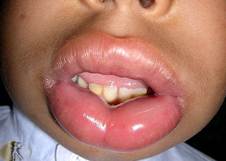
Source: Dr Shahbaz A Janjua; http://www.dermnetnz.org/reactions/urticaria.html

Pathophysiology
Any allergic reaction, including the most extreme form, anaphylactic shock, occurs because the body's immune system reacts inappropriately in response to the presence of a substance that it wrongly perceives as a threat.
An anaphylactic reaction is caused by the sudden release of chemical substances, including histamine, from cells in the blood and tissues. These cells are mast cells and basophils.
The release is triggered by the reaction between the allergic antibody (IgE) with the substance (allergen) causing the anaphylactic reaction.
The released chemicals act on blood vessels, resulting in dilatation (opening up) of the vessels. The skin can become red and, with fluid leakage from the vessels, tissues may become swollen. This is common around the eyes and mouth.
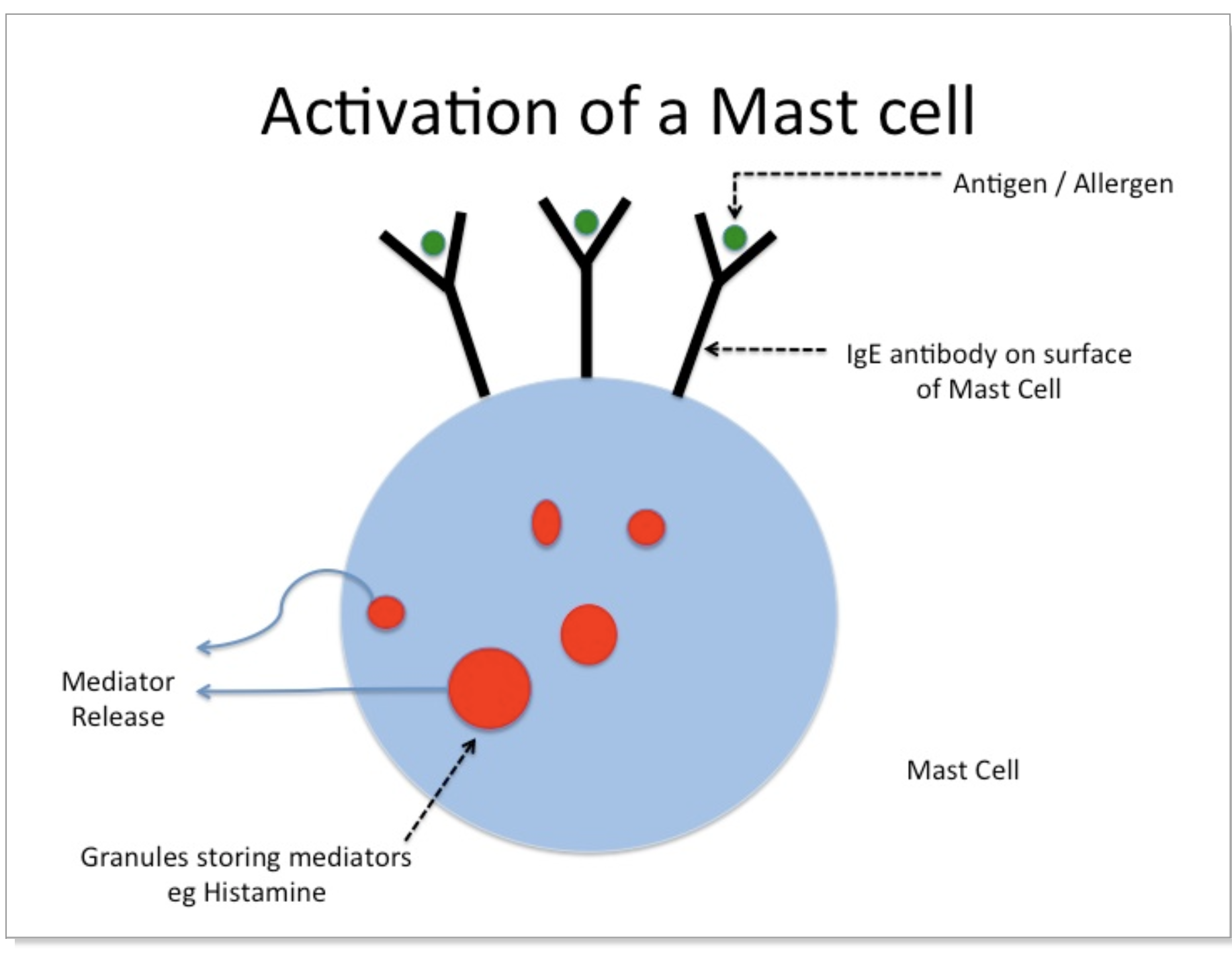
There may be a fall in blood pressure and, especially in asthmatics, there may be wheezing and narrowing of the airways.
Not all anaphylaxis is caused by allergy (IgE) antibodies. Some reactions are caused by direct effects on the mast cells/basophils, e.g. allergic reactions to aspirin and other anti-inflammatory drugs.
Risks
How likely is a person to die from anaphylaxis?
Although anaphylaxis is not uncommon and can be life-threatening, deaths are rare. The risk can be reduced with proper precautions: avoiding triggers and prompt treatment with adrenaline.
Overseas studies have found that co-existing asthma has a major part to play in deaths, so it’s important that you keep your asthma well controlled, even if it’s mild. Be careful, not fearful.
How to know if there is a risk from anaphylaxis?
If someone suffered a severe allergic reaction in the past – whatever the cause – then any future reaction may be severe. If you suffered a significant reaction to a tiny dose, or have reacted on skin contact, this might also be a sign that a larger dose may trigger a severe reaction.
If someone has asthma as well as allergies, this can put him/her in a higher risk category. Where foods such as peanuts, nuts, seeds, shellfish and fish are concerned, even mild symptoms should not be ignored because future reactions may be severe.
Diagnosis
The doctor will normally ask a series of questions that may help to narrow down the list of likely causes such as foods or medicines consumed that day, or insect stings.
This approach will also help to exclude conditions that can sometimes be confused with anaphylaxis, like fainting or panic attacks.
If an allergy is suspected, this may be followed by allergy tests, usually by skin prick tests or blood tests, to help confirm or exclude potential triggers.
Management
Adrenaline works by strengthening the heartbeat, opening up the airways and raising blood pressure (vasoconstriction.
Adrenaline (epinephrine) is the recommended first aid drug for anaphylaxis.
Antihistamines treat hives and runny nose but not anaphylaxis and should never be used instead of adrenaline for anaphylaxis.
If you have an asthma inhaler (e.g. Ventolin) use this after your adrenaline auto-injector (EpiPen) for breathing problems, not before.

Epipen (Adult and Child)
Anaphylaxis Facts
Duration of anaphylactic reaction:
Days to weeks
The half-life of adrenalin:
Up to 5 minutes – needed to be repeated or infused continuously
Major predictors of mortality in anaphylaxis:
Asthma, heart disease and other serious illness
How long a young patient tolerates low blood pressure?
Relatively long time as far as the patient is lying flat
Do anaphylaxis patients need intravenous fluids?
Heaps; 4-5 liters of crystalloids or colloids.
Does anaphylaxis cause a capillary leak?
Huge
Do anaphylaxis patients develop vasodilatation?
Huge
Do anaphylaxis patients get heart failure?
Absolutely. Histamine and other mediators released are negative inotropes (inhibit heart contractions) and may cause arrhythmias (irregularities in heartbeats).

|
How to use EpiPen
|
Anaphylaxix Algorithm
|
Anaphylaxis Algorithm |
Ampules and Vials

IM Injection

IM Injections
USUAL SITE | MAXIMUM AMOUNT | ANGLE | SYRINGE | GAUGE | LENGTH | ASPIRATION |
Deltoid | 1 cc | 90° | 2.5 to 5 cc | 20 to 22 | 1 " to 1 1/2" | YES |
Gluteus Medius or Gluteus Maximus | 5 cc | 90° | 2.5 to 5 cc | 20 to 22 | 1 " to 1 1/2" | YES |
Vastus Lateralis | 5 cc | 90° | 2.5 to 5 cc | 20 to 22 | 1 " to 1 1/2" | YES |
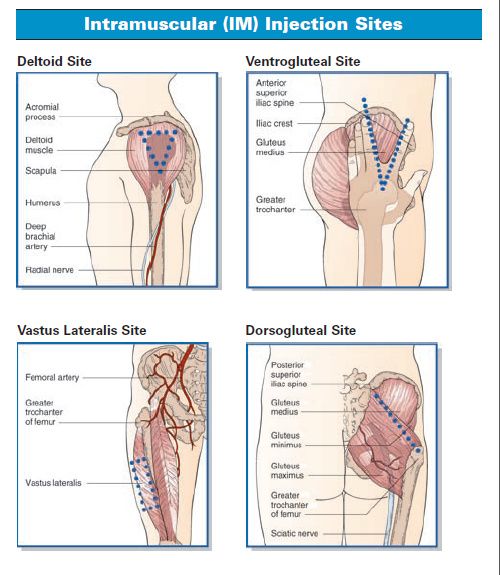
Source: https://www.pinterest.nz/pin/6403624453699224/
ACC cover
ACC will not cover allergic reactions that are of a mild to moderate nature, such as (but not limited to) itching, rashes, sneezing and hay fever and all underlying allergic conditions.
ACC will provide cover if you have an anaphylactic reaction to an allergen caused by your employment if you have an anaphylactic reaction to food or insect venom out of the workplace.
Severe reactions triggered by treatment such as a standard antibiotic treatment are covered if it is not a necessary part of an ordinary consequence of the treatment.
Where cover has been approved, you may be entitled to the whole range of entitlements available under ACC, which includes weekly compensation, lump sum compensation, treatment, social rehabilitation and vocational rehabilitation.
ACC claims should be lodged by the doctor and/or emergency service involved at the time of the anaphylactic reaction. You should check as soon as possible if a claim has been made on your behalf. If an ACC claim was not lodged, you should query this with your GP and/or your local ACC office.
The cover should include the following:
- Cost of an ambulance and the emergency care and treatment
- Referral to an allergy specialist service for an assessment
- The cost of your EpiPen reimbursed if you used it to treat your reaction. You will need a copy of your receipt in order to do this, and you will also need to make sure that medical records relating to the ACC claim show that your EpiPen was used.



